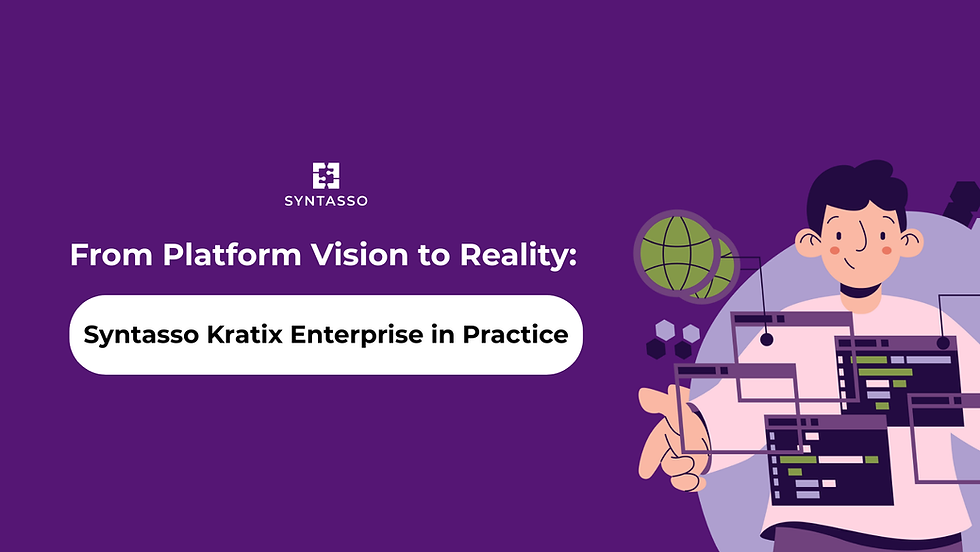Three Trends to Watch in Platform Engineering for 2025
- Daniel Bryant

- Jan 10, 2025
- 3 min read
As platform engineering continues to evolve, 2025 promises to bring exciting new opportunities and challenges for organisations looking to optimise their developer experience and accelerate software delivery. Here are three key trends that will shape the future of platform engineering in the coming year.
Composability Becomes the Standard
In 2025, composability will move from a niche concept to a foundational principle for platform engineering. Organisations are increasingly looking to build modular, reusable components that can be easily assembled into tailored workflows for developers. This is a big part of the "platform as a product" movement that is seeing increasing traction.
This shift is being driven by:
Demand for Flexibility: Enterprises are embracing polyglot programming environments, necessitating tools and platforms that can seamlessly integrate across languages, frameworks, and environments.
Rise of Composable Platforms: Frameworks like Backstage and Kratix are paving the way for platforms designed with composability at their core, enabling teams to mix and match capabilities to meet specific needs.
Developer Self-Service: Modular systems empower developers to create and manage their environments without waiting on ops teams, leading to faster delivery cycles and higher satisfaction.
To stay ahead, platform teams should focus on building APIs and interfaces that promote interoperability and allow easy integration of third-party tools.
You can learn more about this in my recent KubeCon NA talk: "Platform Engineering for Software Developers and Architects":
Data-Driven Platform Optimization
The rise of data-driven decision-making is extending into platform engineering, with teams increasingly leveraging metrics to optimise their platforms.
In 2025, we’ll see:
Enhanced Observability: Tools like OpenTelemetry and advanced AIOps solutions will make capturing and analysing platform usage data easier, identifying bottlenecks and areas for improvement.
Outcome-Oriented Metrics: Frameworks like DORA and SPACE will remain central to assessing the impact of platforms on developer productivity and overall business outcomes.
Personalised Developer Experiences: Leveraging usage patterns and feedback loops, platform teams can offer more tailored experiences to individual developers or teams.
Data-driven insights will be critical to ensuring platforms remain efficient, scalable, and aligned with organisational goals.
You can learn more about these topics in our webinar from last year, "Platform Engineering for Execs: Team Topologies, Tools, and Tradeoffs," with Sarah Wells and Paula Kennedy.
Generative AI Transforming Developer Platforms
Obviously, I can't write a forward-looking piece of content without mentioning AI and LLMs! Generative AI is reshaping many aspects of software engineering, and in 2025, it will play a pivotal role in platform engineering.
Key areas of impact include:
Code Generation: AI tools are automating boilerplate code generation, configuration file creation, and even more complex tasks like writing CI/CD pipelines.
AI-Powered Observability: Machine learning models will detect anomalies and predict potential failures within platforms, enhancing reliability and reducing downtime.
Intelligent Documentation: AI will improve platform documentation by generating contextual, up-to-date content that evolves alongside the platform itself.
Platform engineers should explore partnerships with AI vendors and experiment with integrating AI capabilities into their platforms to improve productivity and innovation.
Conclusion
The platform engineering landscape in 2025 will be shaped by composability, data-driven optimisation, and the transformative power of generative AI. These trends are not just technical shifts—they represent opportunities for organisations to build more effective, developer-friendly platforms that drive business success.
At Syntasso, we’re excited to help our customers navigate these trends with tools like Kratix that empower platform teams to embrace composability, leverage data, and integrate cutting-edge AI.
What trends are you seeing emerge in platform engineering? Share your thoughts with us!



Many gamers from all over the world have been drawn to the well-liked and amusing online game Eggy Car. At first appearance, the game Eggy Car appears to be quite straightforward: the player's goal is to drive as far as they can without dropping the delicate egg that is on top of a small automobile.